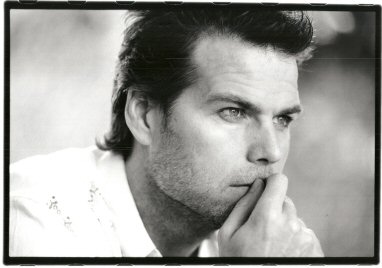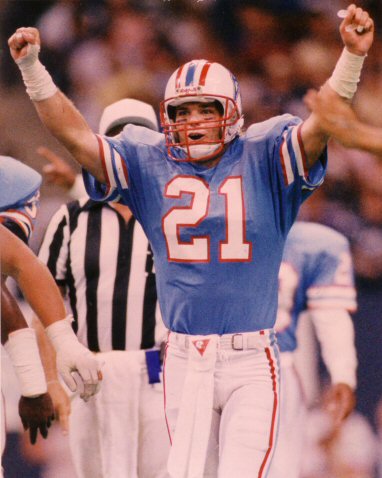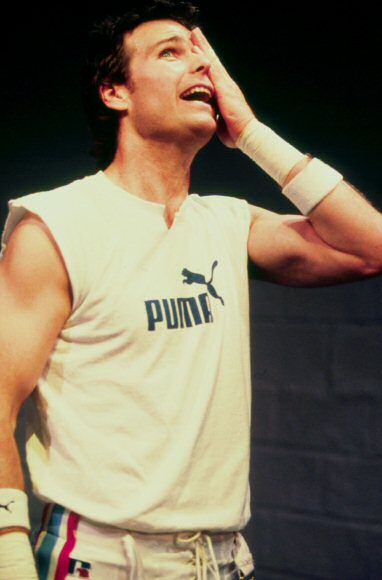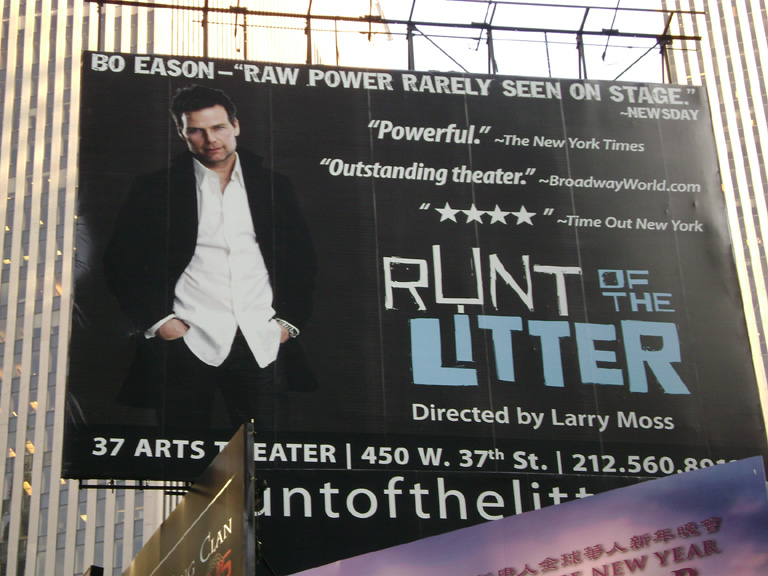Copyright ©2008 PopEntertainment.com. All rights reserved.
Posted:
February 14, 2008.
Even
the words "driven" or "obsessive" would be considered laughable
understatements when describing Bo Eason. His semi-autobiographical
off-Broadway play, Runt of the Litter, is about a little engine that
could;
it's pleasing critics and audiences alike and making its way from
New York to Hollywood.
Also
doing the pleasing is Eason himself, who stars in this one-man show about
his struggles in and out of the stadium. Growing up in a football-obsessed
family in small-town Texas, the sport is in his blood, both when spilling it
on the field or spilling it and his guts onto paper.
The
former collegiate All-American and safety for the Houston Oilers (1984-89)
and now a sought-after actor and writer had nothing handed to him in life
except a football.
And
even that, he busted his ass for.
In
fact, the word "no" was usually his green light.
"People told me my whole life that I couldn't," he recalls in the empty
theater at 37 Arts in Manhattan, a few hours before showtime. "And it would
set me back, and I would get so mad that I would cry. And I would go and
train harder. I would do whatever it took to get that anger and that passion
out of me, because it was driving me crazy that people would say, 'oh, you
can't do it. You're too small. You can't [play football at] our school.
You're too this or that. I always had that coming at me but I never
stopped."
 Typical
safety. Yet there was nothing safe about the likelihood of his dream coming
true.
Typical
safety. Yet there was nothing safe about the likelihood of his dream coming
true.
His
determination to be a part of a sport, despite his size or ability and to
eventually excel in a big way was just short of Glenn Close in Fatal
Attraction.
"I
got cut from my first baseball tryout when I was thirteen," he says, "and I
grew up in a tiny little town. Every little boy basically had to play. I was
so embarrassed and the coach, who I still know to this day, always says to
me, 'I'm the only coach ever to cut you.'
"But
what I did, when I got cut when I was thirteen, is that I never went away. I
did not go away. I'm showing up to practice and everybody is like, 'why are
you here? You're not on the team.' And I say, 'no, I'm just going to
practice.'
"They would say, 'what do you mean, practice? You can't practice. You're not
on the team!" And I said, 'If I'm not good enough to be on the team than I
need the most practice.'
"That's how my brain worked. I need practice more than anybody. You guys
don't need practice. You are already on the team."
If
you've ever seen a sports movie, you know what happens next.
"Eventually, the coach let me play," Eason says, "because I showed up more
than the other guys who were on the team. Eventually, he gave me a uniform
and let me play."
This
would make for a nice little anecdote, but, amazingly, the story doesn't end
there. Eason's focused way of doing things stayed with him, even through
college, as he actually stuck with his twenty-year plan to forge a career in
football.
"In
college [football tryouts]," he says. "I was sent home. But I didn't go
home. I just stayed and stayed and stayed. And kept going to practice and
going to practice.
"The
coaches would walk around saying, 'who is this kid? Didn't we send him home
like two weeks ago? We don't want him around. Get him out of here.' But I
just kept on showing up and showing up, in goofy uniforms that didn't match
the team's. Eventually, they said that if that kid is that committed, let's
keep him around."
 Good
thing, too. Eason eventually made All-American, and the pros.
Good
thing, too. Eason eventually made All-American, and the pros.
Psychoanalysts
would have a field day dissecting this patient, but most of what made Eason
run was obvious. He had an older brother, Tony, who was a football hero, and
would eventually become a quarterback for the New England Patriots. He
looked up to him, while simultaneously trying to dig himself out from his
shadow. As the subtitle to the show reads: He Was Second To One.
The
play, though mostly grounded in autobiographical fact, stirs in an
intriguing "what if:" Eason himself having to go head-to-head with his big
brother on the field. It makes for great drama, but at one point, the
brother-vs.-brother conflict had almost become non-fiction.
"As
fate would have it," Eason says, "right when we were going to play that
game, the players went on strike. That game didn't happen. So we never
played against each other. That always kind of gnawed at me. I was relieved
that I didn't have to make the decisions that I have to make in the story.
It's really the reason I wrote the play. I think it was ten or twelve years
after that. I just said, 'wow, what if I had to get dressed to achieve my
twenty-year plan for the last time, and the obstacle being my brother
standing in the way of all the dreams that I had in my whole life. I would
be playing against the person that I love the most and the person most
responsible for me getting there."
Eason's twenty-year plan, starting at age nine, was to become a professional
football player. Unlike most kids who conceive and stick to a plan like this
for about fifteen minutes, Eason saw it through to the end.
"I
didn't come up with the whole plan at nine, but it built," he says. "I kept
growing it. I didn't know the position of safety when I was nine, but when I
was thirteen, I did. So I said, 'safety, that's what I gotta play.'
"My
brother and I played catch for two and a half hours every day. If you play
like that, that was about a thousand balls [per day]. Later in my life,
because I was on this roll of catching a thousand a day, I would just bounce
them off the wall because I would run out of friends to throw them to me.
You can go much faster that way."
Life
came at him as fast as the footballs. After his stint in the pros, he
pursued his other long-time interest in becoming an actor.
He appeared in Miami
Rhapsody with Sarah Jessica Parker and will appear in Pride and Glory
with Edward Norton and Colin Farrell. He also made numerous TV appearances,
including ER.
"I
always had one eye on our theater department," he says about his first
introduction to drama in high school. "Our theater department was really
small too. And they'd put on Our Town and Skin of Our Teeth
and all these plays. And I would always go and I would always watch but I
would never tell anybody. I loved stage acting. It just looked like a lot of
fun. It looked like an athletic event to me. That's how I saw it.
 "Once
I attended college, I majored in political science, but I minored in drama.
So I would always sneak over after practice and go to acting classes. But I
never told anybody. Those two worlds just never crossed over. I thought
everyone would tease me.
"Once
I attended college, I majored in political science, but I minored in drama.
So I would always sneak over after practice and go to acting classes. But I
never told anybody. Those two worlds just never crossed over. I thought
everyone would tease me.
"I
got drafted in the pros, and in the off season I would study acting. And as
soon as I finished completely with the pros, I moved straight to New York
and I started studying like a madman. Five, six, seven, eight years in a
theater, just putting up scene after scene. Trying to learn it. Trying to
get good at it."
Sound familiar? That incredible discipline followed him when he decided to
write Runt of the Litter, which started out as an exercise in an
acting class, but has now been finely honed since 2002 as a one-man show.
He
says, "I would go to a Borders bookstore in Hollywood near where I lived,
and write for three hours a day, every day, for two years. Writing hasn't
been fun for me. It's lonely."
The
loneliness paid off, though, as the play has aroused the interest of many
hot young actors such as Leonardo DiCaprio, Toby Maguire, Nicholas Cage,
James Franco, and Ryan Phillippe.
In
fact, DiCaprio has commissioned Eason to write a screenplay on the 1924
Olympic Rugby team, which will be produced by DiCaprio's production company.
He is also working on a remake of the seventies TV-movie football classic,
Something for Joey.
Runt of the Litter
is directed by the well-respected Larry Moss (who has also been on the
teaching staff of Juilliard and Circle in the Square). Eason's wife is the
producer of the play, and he is a late-life dad of two young children.
The
play itself has been bought by Frank Darabont (writer and director of The
Shawshank Redemption and The Green Mile) for an adaption to the
screen (written by Eason).
For
Eason, the play itself is more Ordinary People than Rudy.
"I
had no idea it was dark," he says. "Larry Moss saw me do it in his class. To
me, it was like this love letter to my family. It was motivational. It was
inspiring. It was my life. It was what I knew. But Larry just shook his head
and said that is one of the most tragic stories he's ever heard. I didn't
see it like that. I did realize that my life has some tragedy to it, but
because it was my life, it didn't seem that way. I didn't know it was as
dark as it was. People like it, but they tell me that it's violent and dark.
I just never thought that it would go in that direction."
 Although
his own father had never seen a play in his life until he saw his son
perform, and Eason himself has to keep his energy level high for such a
daily psychological and physical demand, Eason says it's all for the
family.
Although
his own father had never seen a play in his life until he saw his son
perform, and Eason himself has to keep his energy level high for such a
daily psychological and physical demand, Eason says it's all for the
family.
"This story is about the real relationship with your mom and your dad, not
the kind you see on TV, but the real ones. Those are touching, man, because
they are so dangerous and scary and painful. Trying to
please them and trying
to get love. Trying to be a success in their eyes. That's what I mean by
dark. It hits you so hard."
Speaking of being hit hard, he now sees without the blinders on.
"I'll be forty-seven next month," he says. "Now, at forty-seven, I look back
at that little nine-year-old as if I were not him, and I think, man, that
little nine-year-old was touched by something."
His
unorthodox method for getting to where he needs to be is considered
admirable and unusual by everybody but him.
"It's the only way I know to bring what I dream about into existence," he
says. "It's the only way I know how."
For
now, with his plate this full, his production continues to build it so that
they will come.
Email
us Let us
know what you
think.
Features
Return to the features page.